First solar eclipse of 2022 seen across South America, Antarctica
Sunday, 01 May 2022 01:53 The first solar eclipse of the year took place Saturday and was viewable from parts of South America and Antarctica.
A live stream of the partial solar eclipse began at 3:30 p.m. EDT and ended when the sun sunk below the horizon.
"If skies are clear, this eclipse is visible from South America, parts of Antarctica, and over the Pacific and Atlantic Oceans," according to TimeandDat
The first solar eclipse of the year took place Saturday and was viewable from parts of South America and Antarctica.
A live stream of the partial solar eclipse began at 3:30 p.m. EDT and ended when the sun sunk below the horizon.
"If skies are clear, this eclipse is visible from South America, parts of Antarctica, and over the Pacific and Atlantic Oceans," according to TimeandDat Revealing the secret language of dark matter
Sunday, 01 May 2022 01:53 In the Universe, dark matter and standard matter "talk" to each other using a secret language. This "discussion" happens thanks to gravity, scientists say, but not in a way they can fully comprehend. A new SISSA study published in "The Astrophysical Journal" sheds light on this long-standing issue.
The authors of the research, Ph.D Student Giovanni Gandolfi and supervisors Andrea Lapi and
In the Universe, dark matter and standard matter "talk" to each other using a secret language. This "discussion" happens thanks to gravity, scientists say, but not in a way they can fully comprehend. A new SISSA study published in "The Astrophysical Journal" sheds light on this long-standing issue.
The authors of the research, Ph.D Student Giovanni Gandolfi and supervisors Andrea Lapi and Spinning stars shed new light on strange galactic signal
Sunday, 01 May 2022 01:53 Researchers from The Australian National University (ANU) have found an alternative explanation for a mysterious gamma-ray signal coming from the centre of the galaxy, which was long claimed as a signature of dark matter.
Gamma-rays are the form of electromagnetic radiation with the shortest wavelength and highest energy.
Co-author of the study Associate Professor Roland Crocker said
Researchers from The Australian National University (ANU) have found an alternative explanation for a mysterious gamma-ray signal coming from the centre of the galaxy, which was long claimed as a signature of dark matter.
Gamma-rays are the form of electromagnetic radiation with the shortest wavelength and highest energy.
Co-author of the study Associate Professor Roland Crocker said What is CAPSTONE?
Sunday, 01 May 2022 01:53 A microwave oven-sized CubeSat weighing just 55 pounds will serve as the first spacecraft to test a unique, elliptical lunar orbit as part of the Cislunar Autonomous Positioning System Technology Operations and Navigation Experiment (CAPSTONE). As a pathfinder for Gateway, a Moon-orbiting outpost that is part of NASA's Artemis program, CAPSTONE will help reduce risk for future spacecraft by vali
A microwave oven-sized CubeSat weighing just 55 pounds will serve as the first spacecraft to test a unique, elliptical lunar orbit as part of the Cislunar Autonomous Positioning System Technology Operations and Navigation Experiment (CAPSTONE). As a pathfinder for Gateway, a Moon-orbiting outpost that is part of NASA's Artemis program, CAPSTONE will help reduce risk for future spacecraft by vali Blue Canyon Technologies expands into GEO with its first cubesat
Sunday, 01 May 2022 01:53 Small satellite manufacturer and mission services provider Blue Canyon Technologies LLC ("BCT" or "Blue Canyon"), a wholly-owned subsidiary of Raytheon Technologies, assisted in the deployment of Ascent, the company's first CubeSat spacecraft bus launched to a geostationary, or GEO, orbit by the Air Force Research Laboratory as part of the U.S. Space Force's Test Program-3 mission.
Blue Ca
Small satellite manufacturer and mission services provider Blue Canyon Technologies LLC ("BCT" or "Blue Canyon"), a wholly-owned subsidiary of Raytheon Technologies, assisted in the deployment of Ascent, the company's first CubeSat spacecraft bus launched to a geostationary, or GEO, orbit by the Air Force Research Laboratory as part of the U.S. Space Force's Test Program-3 mission.
Blue Ca Emirati astronaut to fly long-duration space station mission
Saturday, 30 April 2022 15:33
The United Arab Emirates will fly an astronaut on a long-duration mission to the International Space Station through an agreement with Axiom Space.
The post Emirati astronaut to fly long-duration space station mission appeared first on SpaceNews.
50 years on, Apollo 16 moonwalker still 'excited' by space
Saturday, 30 April 2022 06:38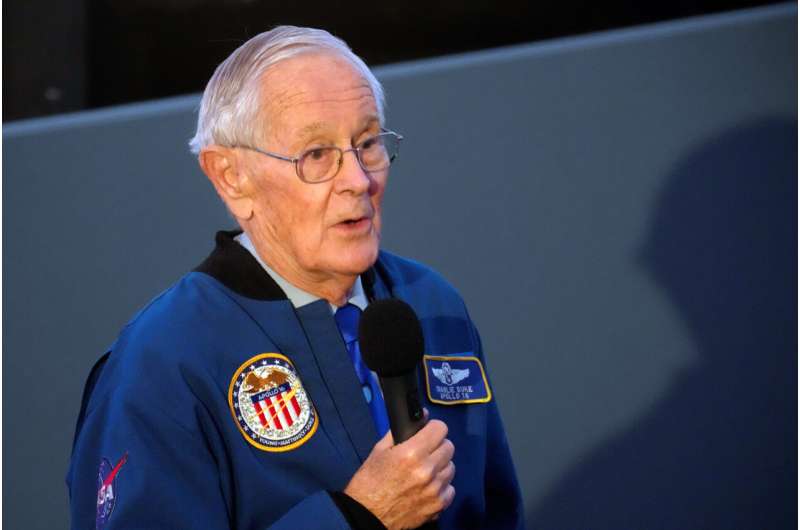
Fifty years after his Apollo 16 mission to the moon, retired NASA astronaut Charlie Duke says he's ready for the U.S. to get back to lunar exploration.
Part of that effort, Duke said Friday, will come in the form of the Artemis program, which includes NASA's upcoming flight to the moon using its new Space Launch System rocket.
First Dream Chaser vehicle takes shape
Friday, 29 April 2022 21:28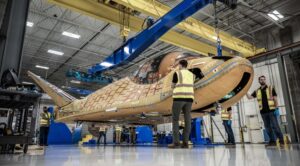
Sierra Space says it is making good progress on its first Dream Chaser spaceplane as the company looks ahead to versions of the vehicle that can carry crews and perform national security missions.
Arabsat orders first fully software-defined satellite
Friday, 29 April 2022 15:42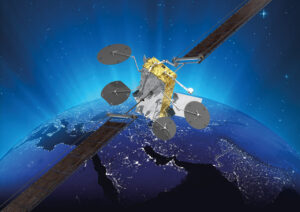
Saudi Arabian fleet operator Arabsat has ordered its first fully software-defined geostationary satellite to provide flexible coverage across the Middle East, Africa and parts of Europe.
The post Arabsat orders first fully software-defined satellite appeared first on SpaceNews.
UAE to send astronaut on six-month ISS mission
Friday, 29 April 2022 13:40
The United Arab Emirates announced Friday it will send an astronaut on a six-month mission to space, as it seeks to become a major player in the industry.
The wealthy Gulf country signed "a new agreement to send the first Arab astronaut on a long 180-day mission to the International Space Station", tweeted UAE's vice president, Dubai ruler Sheikh Mohammed bin Rashid Al-Maktoum.
"Proud of the UAE's youth," he added.
According to the UAE's The National newspaper, the Mohammed bin Rashid Space Centre (MBRSC) and Axiom Space signed a deal on Wednesday at the Emirati embassy in Washington.
Blasting Earth's location out to potential aliens is a controversial idea. Two teams of scientists are doing it anyway
Friday, 29 April 2022 13:05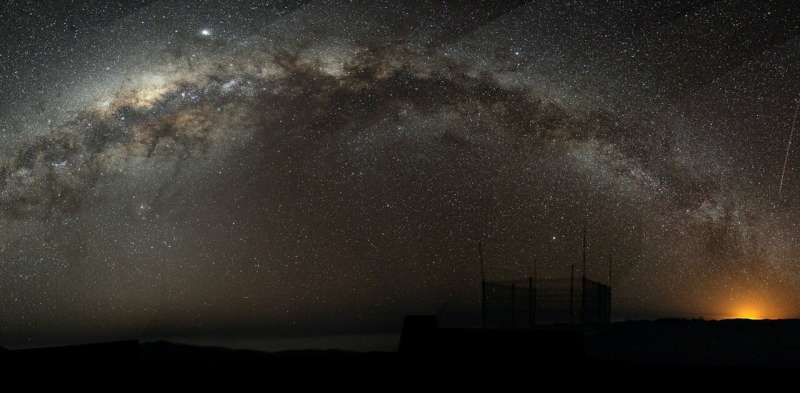
If a person is lost in the wilderness, they have two options. They can search for civilization, or they could make themselves easy to spot by building a fire or writing HELP in big letters. For scientists interested in the question of whether intelligent aliens exist, the options are much the same.
For over 70 years, astronomers have been scanning for radio or optical signals from other civilizations in the search for extraterrestrial intelligence, called SETI. Most scientists are confident that life exists on many of the 300 million potentially habitable worlds in the Milky Way galaxy.
Heatwave across India
Friday, 29 April 2022 12:15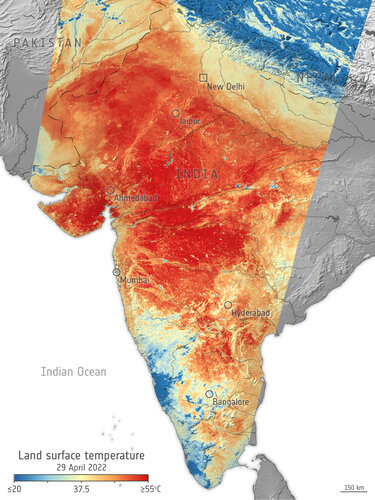 Image:
India is currently facing a prolonged heatwave, with temperatures exceeding 42°C in numerous cities across the country. This map, generated using data from Copernicus Sentinel-3, shows the land surface temperature on 29 April.
Image:
India is currently facing a prolonged heatwave, with temperatures exceeding 42°C in numerous cities across the country. This map, generated using data from Copernicus Sentinel-3, shows the land surface temperature on 29 April. Week in images: 25-29 April 2022
Friday, 29 April 2022 12:03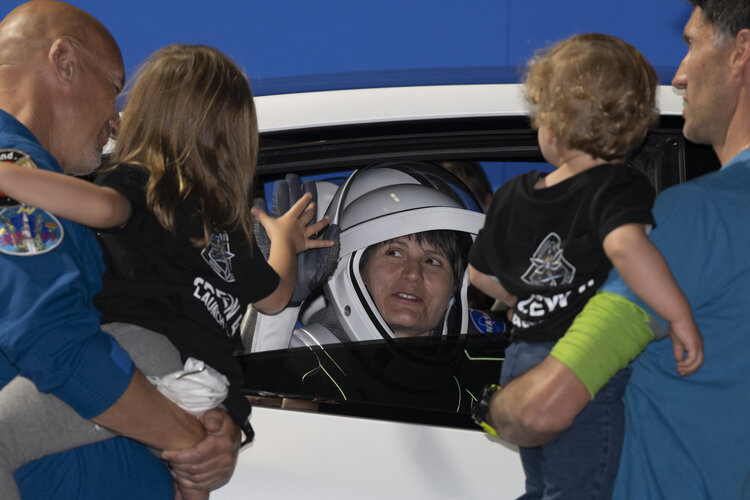
Week in images: 25-29 April 2022
Discover our week through the lens
First Ariane 5 of 2022 slated for June launch of Measat-3d and GSAT-24
Friday, 29 April 2022 11:27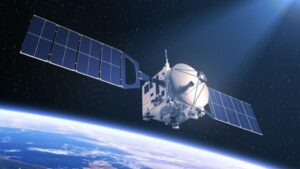
A pair of satellites from Malaysia and India are slated to launch in late June on the Ariane 5 rocket’s first flight of the year.
The post First Ariane 5 of 2022 slated for June launch of Measat-3d and GSAT-24 appeared first on SpaceNews.
China launches pair of commercial remote sensing satellites, sea launch scrubbed
Friday, 29 April 2022 08:41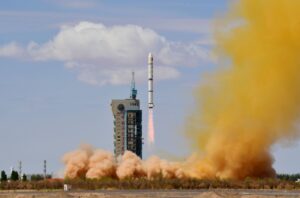
HELSINKI — A Long March 2C rocket sent a pair of optical remote sensing satellites into orbit early Friday to provide commercial remote sensing imagery.

